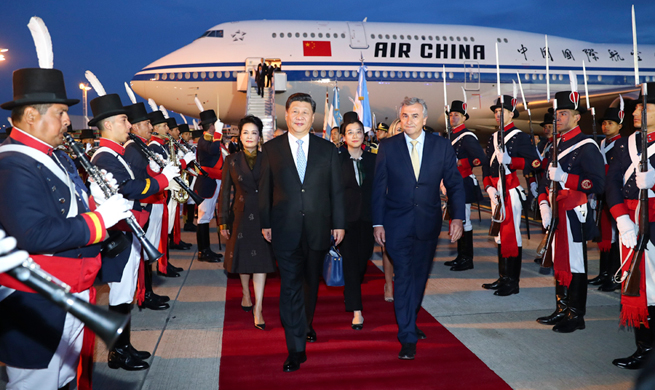BERLIN, Nov. 30 (Xinhua) -- The number of overtime hours worked by German employees has risen sharply during the past years, the newspaper Rheinische Post (RP) quoted official figures as reporting on Friday.
According to the German government's official response to a Left party (Linke) parliamentary enquiry cited by RP, Germans accumulated a total of 2.127 billion euros (2.42 billion U.S. dollars) of overtime in 2017.
The figure marked the highest level in a decade and was derived by the German government on the basis of analyses by the Institute for Employment Research (IAB), the research institute of Germany's Federal Employment Agency, as well as surveys conducted by the Ifo Institute for Economic Research (Ifo).
While the number of overtime hours worked rose by 11 percent between 2016 and 2017, the RP highlighted that only half of the total additional volume of labor was remunerated. Roughly 11 billion hours were delivered to German employers for free by their staff, a circumstance which was estimated by the Left party labor market expert Jessica Tatti to have resulted in savings to companies worth over 36 billion euros.
A survey by the Federal Institute for Occupational Safety and Health (BAuA) suggests that most German employees felt like they had no choice other than to do overtime. 33 percent of respondents who did more than two hours of overtime each week indicated that their contractually-defined tasks were unachievable in a regular time-frame and roughly half cited operational reasons and requirements, while a mere 15 percent said that they stayed on longer because they enjoyed their work and only five percent did so to obtain higher pay. The German government's response to the parliamentary enquiry showcased that some sectors of the domestic economy and types of jobs were particularly prone to overtime.
Management consultants and other business service providers led the list of average overtime hours, followed by Information Technology (IT) and communications professions, agriculture and forestry as well as retail and gastronomy. In all of these areas, the share of overtime hours amounted to more than four percent of the total hours worked.
For Tatti, the findings were generally a sign that an "anti-stress-directive" was overdue in Germany. In order to curb the abuse of overtime, the Left politician called for shortening the maximum amount of legally-permissible hours per employee week from 48 to 40.
The confederation of German trade union(DGB) was similarly alarmed at the rise of overtime in the eurozone's largest economy on Friday. "The number of overtime hours worked in 2017 has reached an unacceptable level and constitutes a high health risk to employees", DGB leader Reiner Hoffmann told RP.













